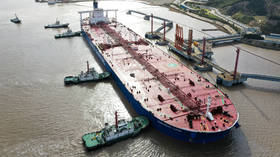Russia can dodge G7 oil price cap – Reuters

Russia will continue to be able to ship most of its oil to customers after the G7 price cap mechanism comes into force on December 5, Reuters reported on Friday, saying the country has access to enough tankers and services, its own as well as those in Asia, to continue trade.
The Group of Seven leading economies – the US, Canada, France, Germany, Italy, the UK and Japan – agreed last month to enforce a price ceiling on Russian oil in a bid to curb the country’s revenue from energy exports. The price limit hasn’t yet been decided. Banking, insurance and shipping firms will also be banned from providing services to Russian companies that sell oil at a price above the set limit. December 5 also marks the deadline for the EU to ban all imports of Russian seaborne crude.
However, according to a US Treasury official quoted by Reuters, between 80% and 90% of Russian oil could continue to flow outside the cap mechanism.
Some ships are changing their countries of origin and trading entities are being moved beyond the G7 in order to evade the cap, the official added.
“In theory, there is a big enough shadow fleet to continue Russian crude flows after December 5,” Andrea Olivi from commodities trading giant Trafigura told Reuters.
“A lot of these shadow vessels will be able to self-insure or they will be able to be insured by Russian P&I [protection and indemnity insurance],” he added.
In addition to its own tankers, Russia could also employ Chinese and Indian ships, and oil traders and insurance companies will come from the Middle East and Asia, Reuters noted, quoting industry representatives.
Russia is the world’s third-largest oil producer, according to the US Energy Information Administration. The price cap could reportedly be set at $60 per barrel as opposed to the current price of around $90. Russia said it will not supply oil and other commodities under a price cap or if it deems the trade conditions unprofitable.
For more stories on economy & finance visit RT's business section













